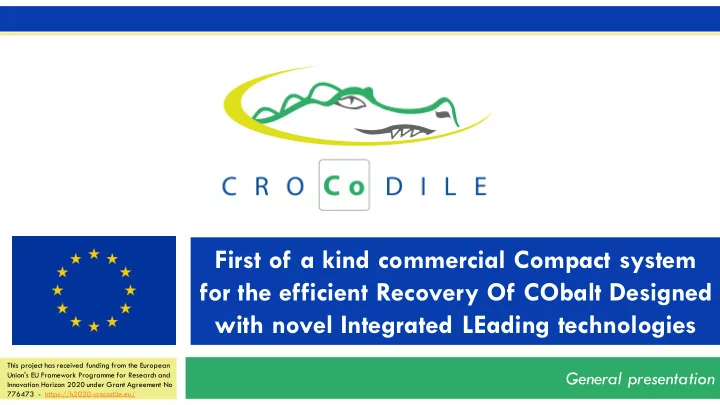

First of a kind commercial Compact system for the efficient Recovery Of CObalt Designed with novel Integrated LEading technologies This project has received funding from the European General presentation Union's EU Framework Programme for Research and Innovation Horizon 2020 under Grant Agreement No 776473 - https://h2020-crocodile.eu/
The Crocodile project 2 First of a kind commercial Compact system for the efficient Recovery Of CObalt Designed with novel Integrated LEading technologies http://h2020-crocodile.eu/ Solution: Challenge: Provide a zero-waste strategy for Improve the economic and environmental important waste streams rich in cobalt values of recovery processes of cobalt in such as batteries. Europe. CROCODILE Funding & Duration: Targeted feedstocks: Horizon 2020 - Grant Agreement No. The targeted primary and secondary raw 776473- EC contribution: 11 625 289€ materials are laterite mines, autocatalysts 4 years: from June 2018 to May 2022 and batteries.
The Crocodile objectives 3 Demonstrate scaled-up innovative ➢ integrated systems and technologies capable of enhancing the efficiency of existing raw materials recovery processes; DES Leaching reactor at Tecnalia (left), Bioleaching experiments with COG3 samples conducted by COG3 Develop a new mobile system with the ➢ partner Acidophile Research Team at Bangor University (center) and the EcoRecycling mobile plant (right) capability of producing cobalt metal to enable new business opportunities and expand the business across the EU; Build a strong value chain capable of ➢ supplying approx. 10,000 ton of cobalt per year (about 65% of the current EU demand) from mainly European resources. CROCODILE mobile solution overview
The Crocodile consortium 4 CROCODILE This project has received funding from the European Union’s Horizon 2020 research and innovation programme under grant agreement No 776473 - https://h2020-crocodile.eu
The Crocodile project activities (1/2) 5 Build a commercial compact mobile system with a capacity of up to 200kg of cobalt metal per day-65ton/year; Optimise the pretreatment step of secondary waste rich in cobalt by advanced mechanical, wet mechanical process and pyrometallurgy; Fine-tune the recovery process, from economic and environmental point of view, designed in a closed-loop set up, reducing OPEX and waste generation.
The Crocodile project activities (2/2) 6 Scale up the bio-processing route for primary resources; Develop a detailed market analysis and business models based on process efficiency, metal stock exchange and market share, and an engagement strategy with investors; Engage with civil society to obtain a social license to operate and to co- develop the CROCODILE solution.
Life Cycle Assessment 7 A methodology that takes into account the health, safety and environmental risks. Addressing REACH, RoHS and local environmental standards. Modelling of the pilot unit and design. Economic and environmental assessment of the pilot unit.
Material Flow Analysis 8 Environme Environmen Environment ntal tal stressors statistics Market Economic and Economics supply & trade demand data Environme ntal Security Societal policy and Supply instrument s
The Crocodile project benefits 9 Reduce drastically the supply risk of cobalt for the European industry Lower energy costs and environmental impacts Providing solutions with low capital investment costs Maximize the exploitation of the local waste.
10 Contact TECNALIA Dr. Amal Siriwardana (Project Coordinator) Amal.Siriwardana@tecnalia.com http://h2020-crocodile.eu/ CROCODILE is a project funded by the European Commission. This project has received funding from the European Union's Horizon 2020 Research and Innovation program under Grant Agreement n° 776473
Recommend
More recommend